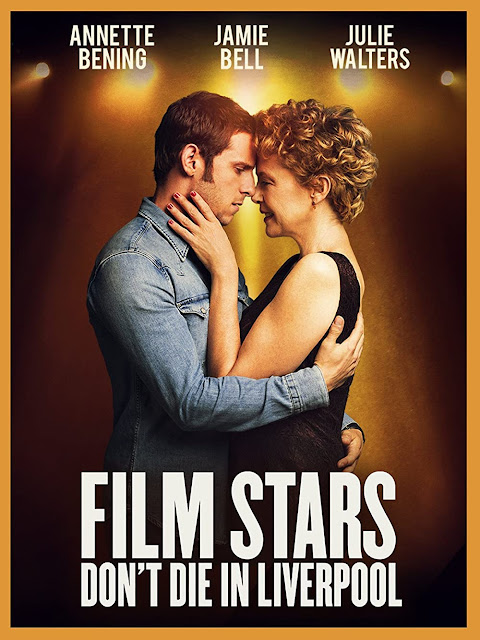The plot: Old Hollywood actress Gloria Grahame (Annette Bening), after a health scare backstage in the U.S., decides to go to Liverpool and stay with Peter Turner (Jamie Bell), an aspiring actor and Gloria's former lover. As Peter and his family take care of her and the two reconnect over their past, Gloria is faced with not only her own mortality but also how her age, his past romances and her career have shaped her and how she is perceived by others.
Bening plays a famous Golden Age Of Hollywood
actress in a way that makes her come across as the genuine article, balancing
out a seriously infectious spirit with the nimbleness required to weave through
the surprisingly complex psychology of her character. Bell, considering this is his first film
role since the legendary car crash that is Fant4stic, is quite relieving in how well he does in the role. He fits in nicely alongside Bening as
his romantic interest, but it’s the way he handles his dialogue that deserves
major points. He comes across like someone who makes mistakes but more out of
his own awkwardness than anything resembling malice. As someone who tends to
run across social anxiety more times than I would like, I can definitely
sympathise.
Julie Walters, Kenneth Cranham and Stephen Graham as Peter’s family
work okay, although they definitely pale in comparison to our main leads,
Vanessa Redgrave as Gloria’s mother gives a lot of dramatic and even poetic
oomph to her sole scene, and Frances Barber as Gloria’s sister delivers
downplayed venom eerily well. Like, to the point where you start to wonder if
that chemistry went beyond the frame; that’s how solid it is, even for a single
conversation.
Even considering how the romance is meant to be
the main draw of the film, it’s pretty muddled in how it’s handled. On one
hand, the romantic chemistry is very good between our leads, making the
May-December relationship work among the best I’ve seen when it comes to recent
films. On the other hand, the story that revolves around that coupling is
rather plain. The visuals end up telling a lot more than the dialogue does in
most cases, like how Gloria’s health issues are revealed on-screen, but the
main threads tying a lot of those moments together feels a bit lacklustre. As
fun as it is to see Bening and Bell act off of each other, the writing doesn’t
carry enough vibrance or intensity to make what we’re seeing really register
that much.
Thankfully, Bening seems more than capable of
carrying the entire film on her back, as the majority of the film’s best
touches centre on her. For one, the way it deals with her sexuality is quite
refreshing. Maybe it’s because the average moviegoer would follow up the phrase
“older people have sex too” with a retort of “yeah, but I still don’t want to
see it”, but seeing an older woman on-screen that is shown as being this in-control of her own libido is
rather commendable. Knowing how romance and especially sex have largely been
dominated by the picturesque, the young and the mostly lecherous, seeing
something this tender not only gives Gloria’s love life a definite kick but it
also goes some way to dispel a few myths concerning female sexuality. Bonus
points for a rather small scene between her and Peter that alludes to
bisexuality; this is the kind of representation that warms my heart ever so
slightly. Hell, it even manages to balance that out with Gloria’s real-life
romantic history, showing a rather refreshing amount of normalcy towards her
line of ex-husbands that goes into reasonable questions about her commitment…
but not to the point of shaming her at any point. Have to admit, that’s a hell
of a tightrope to walk.
Same goes for how that plays into the notions
of fame, love and beauty, taking Gloria’s position as a faded Hollywood starlet
and running with it. It’s here that the film gets its biggest marks, as it not
only highlights Gloria’s worries about how age has affected her, it also wraps
it up in a coda that acknowledges her agency as a person. Parts of it are
informed through her relationship with Bell, something shown with some serious
finesse in how the film lets us witness both sides of the argument that
ultimately splits them up, but the majority of it is informed by her own words
and actions. As I’ve stated in the past, the usual MO for older actors on film
nowadays is self-parody, as if they grew out of their own dignity.
Seeing something like this that actively works against that notion, and gives
quite a few reasons as to why that needn’t be the case, serves as a healthy
reminder that there is still some life in those old bones yet. All they need is
someone to show they care about them.
All in all, while definitely serviceable, I can’t help but
feel like there is a better film in the heart of this whole thing. One that
maintains the commendable acting and visual deftness found here but provides a
more fulfilling romantic vibe that makes the ups and downs feel worthy to be
witnessed. This has a lot of good going for it, most of which is down to
Annette Bening’s fantastic performance, but in its entirety, I can only
consider it an “okay” film.


No comments:
Post a Comment